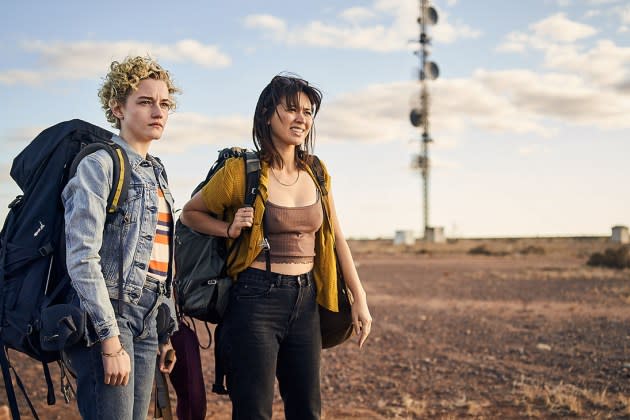‘The Royal Hotel’ Review: Julia Garner and Jessica Henwick in Kitty Green’s Bruising Outback Drama
- Oops!Something went wrong.Please try again later.

Four years after director Kitty Green and actor Julia Garner channeled whispers and silence into the stuff of workplace horror in The Assistant, they reunite for a movie that turns up the volume and ratchets up the fear and loathing. Way up.
Instead of the careerist corridors of Manhattan, the setting is a mining town in Australia — specifically, a hotel bar frequented by hard-drinking men. Garner, again, is extraordinary, and the chemistry between her and an equally superb Jessica Henwick, as best friends whose backpacking adventure takes a detour into a kind of hell, doesn’t hit a false note. Yet despite the flawless performances and outstanding craftsmanship, The Royal Hotel is a pummeling experience rather than a revelatory one.
More from The Hollywood Reporter
For her second narrative feature, and her first film set and filmed in her native Australia, Green was inspired by the 2016 documentary Hotel Coolgardie, in which Pete Gleeson chronicles the experiences of two young Scandinavian women who sign on for a temporary live-and-work stint at an isolated bar. There’s also an unmistakable throughline between Green’s film, co-written with Oscar Redding, and Ted Kotcheff’s 1971 psychological thriller Wake in Fright, also set in a mining town, and a terrifying depiction of the Aussie male cult of alcohol. In that movie, the outback nightmare is a young man’s; Green is interested in the female perspective, and she has two intriguing protagonists through which to explore it.
As close as they are, American traveling partners Hanna (Garner) and Liv (Henwick) react very differently to the situations they find themselves in. The opening scene is a brilliant feint of dislocation that sets the tone — and the din — of what follows. Green and DP Michael Latham thrust us into the pounding cacophony of a dark dance club before revealing that it’s in the lower level of a cruise ship, in the middle of a bright sunny day. Liv, the more easygoing of the two, has made her way to the upper deck to tell Hanna that she’s run out of cash. Her friend’s jaw tightens, but they’re in this together, and so, in order to keep traveling, they sign on for a work-and-travel assignment in the middle of nowhere. The woman who hooks them up with the gig casually cautions, in a priceless bit of euphemism, that they should prepare to be “OK with a little male attention.”
That their new employer is called the Royal is something like that classic “Aristocrats” joke. Hanna wants to leave almost as soon as they get there, and you might feel the same way. Liv urges her to give the place a chance as they take their places behind the bar. Packed with miners and other locals, almost all of them male and drunk, the place is in full-tilt raucousness as the two party-hearty Brits they’re replacing (Alex Malone and Kate Cheel) celebrate their last night in town. The joint is run by Billy (Hugo Weaving), whose every word is a shout, and his laconic partner, Carol (Ursula Yovich), who repeatedly reminds him not to drink and to pay the girls as well as the long-suffering vegetable vendor Tommy (Baykali Ganambarr).
A few regulars come into focus, the most disturbing of the lot the creepily grinning Dolly (Daniel Henshall), who shows up at odd times and places, including outside Liv and Hanna’s upstairs living quarters. To the film’s credit, some of the guys who seemed at first just irredeemably obnoxious reveal sympathetic shadings. A miner named Teeth (James Frecheville) takes a sincere interest in Liv, and Matty (a strong turn from Toby Wallace, who has a pivotal role in another Telluride premiere, The Bikeriders) is drawn to Hanna. He takes her and Liv, whose dreams of Bondi Beach have been sidelined, to a spectacular natural pool under a small waterfall. (The location shooting in South Australia captures the barrenness and the beauty of the setting, and combines seamlessly with well-designed studio interiors.)
The movie’s most interesting dynamic is the yin-yang between Hanna and Liv regarding how long to stick with the near-constant booze-fueled roar and Dolly’s mostly silent seething. “He’s OK,” Liv insists, adding, more accurately, “He’s lonely.” Her willingness to forgive and go with the flow might be insightful and openhearted or simply naïve. And when Hanna reveals to Matty, in the barest few words, that her mother was a problem drinker, the drama deepens and her discomfort comes into sharper relief, Garner’s expertly measured performance revealing the way the child of an alcoholic is practiced in fearing and assuaging a belligerent drunk.
Through it all, Billy’s drinking gets worse and Dolly the monster lurks, a not quite convincing story element, more confusing than scary. By the time Torsten (Herbert Nordrum), a Norwegian traveler Hanna met on the ship, shows up, ostensibly to rescue her, the tension is high, for the characters and the audience alike.
In the final scene, the one female regular at the Royal, a blowsy barfly well played by Barbara Lowing, is moving toward the bar as Hanna and Liv move decisively in the other direction. She’s a living example of what it would mean to make peace with this world. By that point, peace isn’t an option for Green’s two gutsy travelers. She achieves the rising sense of menace her almost-horror story aims for, and her filmmaking has a muscular edge. Yet after all the tightly wound silences and explosive noise, the climax she’s devised feels more mechanical than cathartic.
Best of The Hollywood Reporter
Kim Cattrall and Five Actors Who Made Surprising Returns to a Role
10 Times Hollywood Predicted the Scary (or Not So Scary) Future of AI
21 Actors Who Committed to Method Acting at Some Point in Their Career

